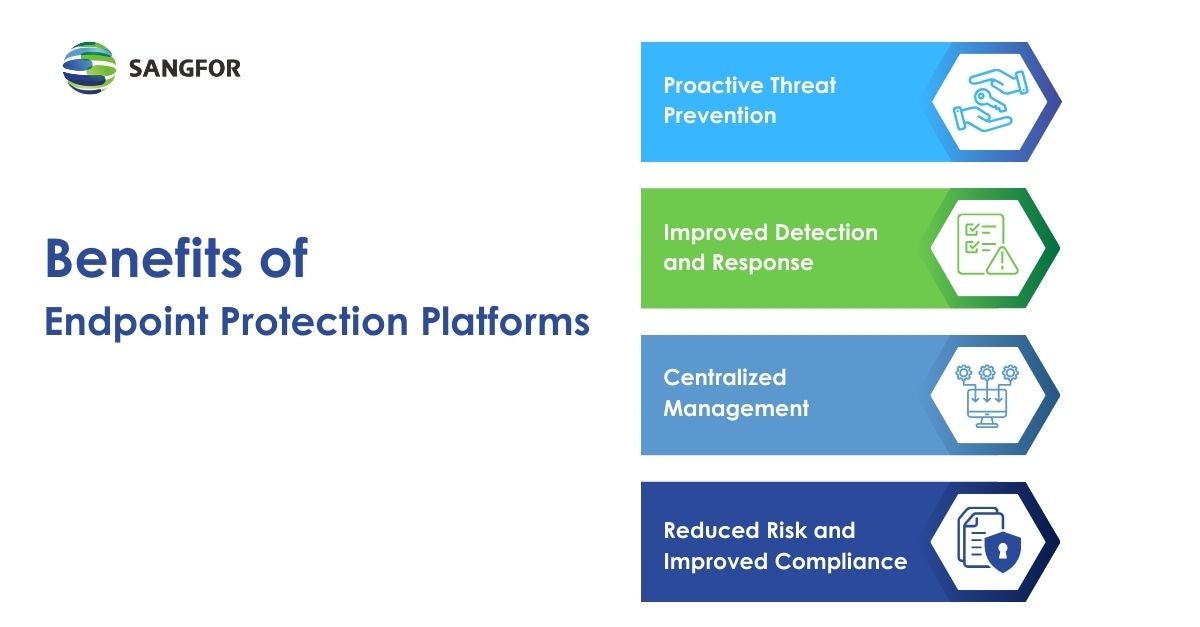What is an Endpoint Protection Platform?
Cyber attacks are constantly evolving, making organizations seek robust security solutions to safeguard their data and critical infrastructure. An Endpoint Protection Platform (EPP) serves as a comprehensive endpoint security solution specifically designed to protect individual devices such as desktops, laptops, tablets, and smartphones within a network. Combining detection and response, EPPs proactively help businesses of all sizes defend against a wide range of cyber threats.
Origins and Purpose of Endpoint Protection Platform
The concept of Endpoint Protection Platforms (EPP) originated in response to the growing need for comprehensive cybersecurity solutions that could protect endpoints against a wide array of threats. As businesses increasingly relied on interconnected devices, the potential attack surface expanded dramatically. The primary purpose of EPPs is to provide a robust defense against malware, ransomware, and other cyber threats, ensuring the integrity and security of sensitive data. By integrating various security measures, such as antivirus, firewall, and intrusion prevention systems, EPPs create a unified solution that simplifies management while enhancing overall protection.
How Do Attackers Commonly Evade Traditional Endpoint Security?
Traditional security software often relies on signature-based detection, which identifies threats based on known patterns. Attackers, however, are constantly developing new and sophisticated malware that can bypass this signature recognition.
Phishing emails with well-disguised links or social engineering tactics can trick users into unknowingly downloading malicious software, further compromising traditional security measures. For instance, an attacker can send an email that appears to be from a legitimate source with a link that downloads malware onto the user's device upon clicking. This malware can steal sensitive information, such as login credentials or financial data, or even encrypt the user's files and demand a ransom payment for decryption.

What Challenges Does an Endpoint Protection Platform Address?
Endpoint protection platforms address and tackle several critical security challenges that traditional solutions may be likely to struggle with. The following are the four key examples:
- Advanced Malware: Endpoint protection platforms go beyond signature-based detection by utilizing advanced techniques like behavior analysis. This allows them to identify and block even zero-day attacks, which are previously unknown malware, by monitoring suspicious program behavior. For example, the platform can detect a program that is trying to access unauthorized files or folders.
- Phishing and Social Engineering: Some Endpoint protection platforms are integrated with email security solutions to filter out phishing attempts and educate users on recognizing suspicious emails. Some EPPs can also analyze email content and attachments for malicious URLs or embedded threats.
- Unsecured Devices: Enforcing security policies on endpoints, an EPP endpoint protection platform can help identify and manage unauthorized devices accessing the network through features such as device control. Device control allows IT administrators to restrict the types of devices that can connect to the network and what actions they can perform while full disk encryption scrambles the data on a device's hard drive, making it inaccessible.
- Data Loss Prevention: To help prevent sensitive data from being leaked, an endpoint protection platform may include a Data Loss Prevention (DLP) feature. This specific EPP functionality allows organizations to define rules for how data can be used and transferred. For example, a DLP policy may prevent employees from emailing sensitive customer data or from transferring files to unauthorized cloud storage services.
What Are the Benefits of an Endpoint Protection Platform?
An Endpoint Protection Platform (EPP) offers a multitude of benefits that enhance your organization's overall security posture, which include the following:
- Proactive Threat Prevention: By leveraging advanced monitoring and detection techniques, an EPP actively identifies and neutralizes suspicious activity and zero-day threats. This comprehensive approach to security significantly reduces the risk of successful cyberattacks on your organization's endpoints.
- Improved Detection and Response: EPPs provide real-time monitoring and threat analysis capabilities, enabling your organization to detect and respond to security incidents swiftly. This allows for faster containment and mitigation of threats, minimizing potential damage and data loss.
- Centralized Management: EPPs offer a centralized management console, streamlining the administration of security policies and settings across all your endpoints. With a centralized approach, your IT team no longer needs to manually configure your individual devices for protection, saving valuable time and resources.
- Reduced Risk and Improved Compliance: With EPP, organizations can significantly reduce the risk of data breaches and ensure adherence to industry regulations. This comprehensive security posture can mitigate the potential for financial penalties and reputational damage associated with security incidents.

Traditional vs. Cloud-native EPPs
When evaluating Endpoint Protection Platforms, organizations often face a choice between traditional and cloud-native EPP solutions. Traditional EPPs are typically installed on local machines, requiring significant resources for updates and management. While they offer solid protection, they may lack flexibility and scalability, making it challenging to adapt to rapidly changing threat landscapes. In contrast, cloud-native EPPs utilize the power of cloud computing to provide real-time updates, centralized management, and enhanced analytics. This approach not only reduces the burden on local resources but also allows for greater scalability and quicker response times to emerging threats, making cloud-native solutions increasingly popular among organizations seeking to stay ahead in cybersecurity.
What Is the Difference between Endpoint Protection Platform (EPP) and Endpoint Detection and Response (EDR)
While both Endpoint Protection Platforms (EPP) and Endpoint Detection and Response (EDR) solutions are valuable tools in the cybersecurity landscape, they address security challenges from different angles.
EPP acts as a first line of defense, providing proactive endpoint protection by assimilating and integrating features such as anti-malware, intrusion detection, and application control into the platform. This approach aims to prevent cyberattacks from establishing a foothold on your devices.
On the other hand, EDR focuses on advanced threat detection, investigation, and response. It offers more than basic prevention through features such as deep analysis capabilities. These functions are able to help organizations identify and neutralize sophisticated threats that may bypass traditional security measures.
EDR is similar to a powerful investigative tool that assists security professionals in dissecting and combating security incidents effectively. Sangfor Endpoint Secure is a cutting-edge Modern Endpoint Protection Platform solution that incorporates advanced EDR capabilities.
How to Choose the Right Endpoint Protection Platform for Your Organization?
There are several aspects you need to consider when choosing a particular endpoint protection platform for your business:
- Features and Capabilities: An EPP should be equipped with multiple advanced technologies. such as machine learning, behavioral analysis, and artificial intelligence, to help effectively identify threats. Select solutions or tools that are verified and recognized by third-party agencies for their robust capabilities.
- Security Needs: Evaluate your risk profile and the type of data you handle to determine the level of endpoint protection required. You may have existing security tools or solutions in place, such as SIEMs, automation tools, and firewalls. Choose a platform that can be integrated with these solutions.
- Easy Deployment and Management: Consider a solution that is easy to deploy and configure from a centralized console. It is also important for its user interface to be user-friendly, making it convenient for your IT personnel to handle and manage.
- Scalability and Future-Proofing: With the possibility of a future expansion of your company, you should select a solution that can be scalable and adaptable to the evolving security needs. An endpoint protection platform should be able to accommodate changes such as increased numbers of endpoints and locations.
Sangfor’s Endpoint Protection Solution
Sangfor Endpoint Secure is a modern EPP solution by Sangfor. This unified platform provides centralized management of endpoint security, threat analysis, compliance checks, access control, threat quarantine, and remote forensic investigation. Endpoint Secure safeguards individual devices with anti-virus, intrusion prevention, and threat reporting capabilities. Sangfor empowers businesses with comprehensive and advanced endpoint protection platforms and solutions.Watch the video below to learn how Endpoint Secure shows its best capability to detect process injection, an advanced ransomware attack technique in as quickly as 3 seconds in this simulated attack. Get in touch with us today to learn more.
EPP Frequently Asked Questions
For optimal protection, organizations should consider updating their endpoint protection platform quarterly so it can remain effective against the latest and more advanced threats. With a consistent schedule for updates, your cybersecurity team can stay informed on new security patches and malware definitions.
Yes, EPP helps ensure consistent security across your geographically dispersed workforces, as it provides protection for many endpoint devices that are used in remote or hybrid work models with the use of a centralized platform.





